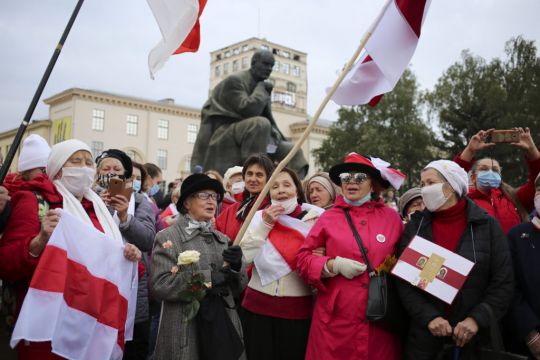Factory workers, students and business owners in Belarus have gone on strike to demand that President Alexander Lukashenko resign after more than two months of continuing mass protests.
Most state-run enterprises continued to operate despite the strike, which was called by opposition leader Sviatlana Tsikhanouskaya.
Mr Lukashenko has run the country for 26 years but protests have rocked Belarus ever since the official results of the election were announced on August 9, giving him a landslide victory with 80% of the vote.
Ms Tsikhanouskaya got only 10% of the votes and refused to recognise the outcome as valid, saying it was manipulated.
On Monday, students in some universities refused to attend lectures and marched in Minsk in protest, while hundreds of small private companies declared Monday a non-working day and shops and cafes closed, with their owners and employees forming human chains all over the capital.

Several divisions of large plants in Minsk said they were halting work and employees of two plants in the western city of Grodno gathered in front of buildings there.
The authorities responded by detaining protesters in the streets and outside factories, threatening workers with jail or being fired if they went on strike, said Alexander Yaroshuk, leader of the Belarusian Congress of Democratic Unions.
Since the disputed election, the authorities have tried to quell the turmoil by detaining thousands and dispersing the crowds but the protests have continued.
Ms Tsikhanouskaya, who fled to Lithuania for fear of her safety, urged the strike if Mr Lukashenko did not resign, release political prisoners and stop the police crackdown by Monday.
She gave the go-ahead for the strike to begin in a statement on Sunday night after police in Minsk and other cities once again dispersed demonstrators with stun grenades and tear gas.
Sunday’s rally in Minsk was one of the largest in weeks and drew nearly 200,000 people, while smaller protests also took place in other cities. The Interior Ministry said it detained over 500 people across Belarus.
“A strike is the next step towards freedom for Belarusians, towards the end of violence and new elections,” Ms Tsikhanousksaya said in a statement on Monday. “The main goal is to show that no one will work for the regime.”
Government officials said that all state-run plants, factories and enterprises continued to operate as usual.







